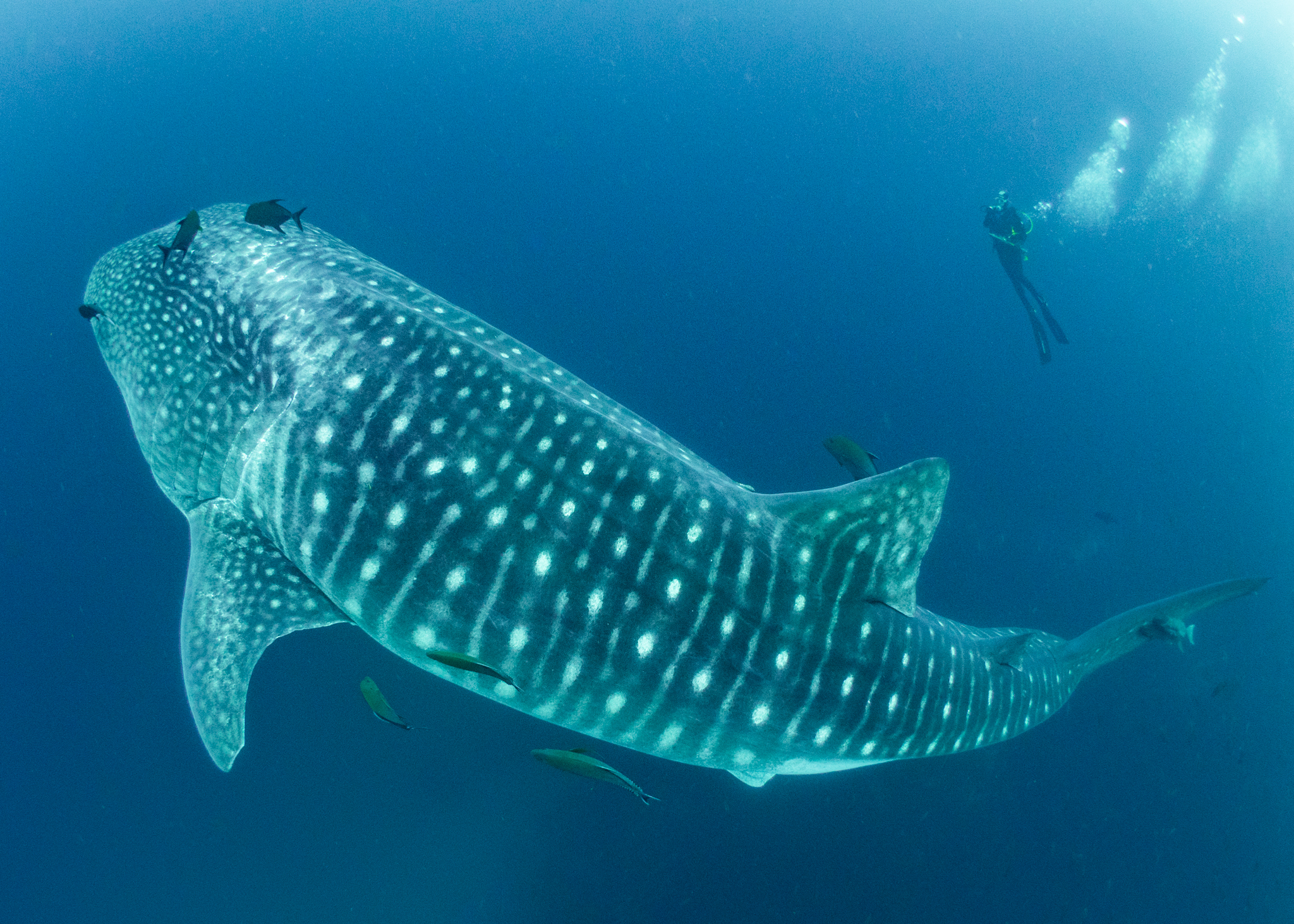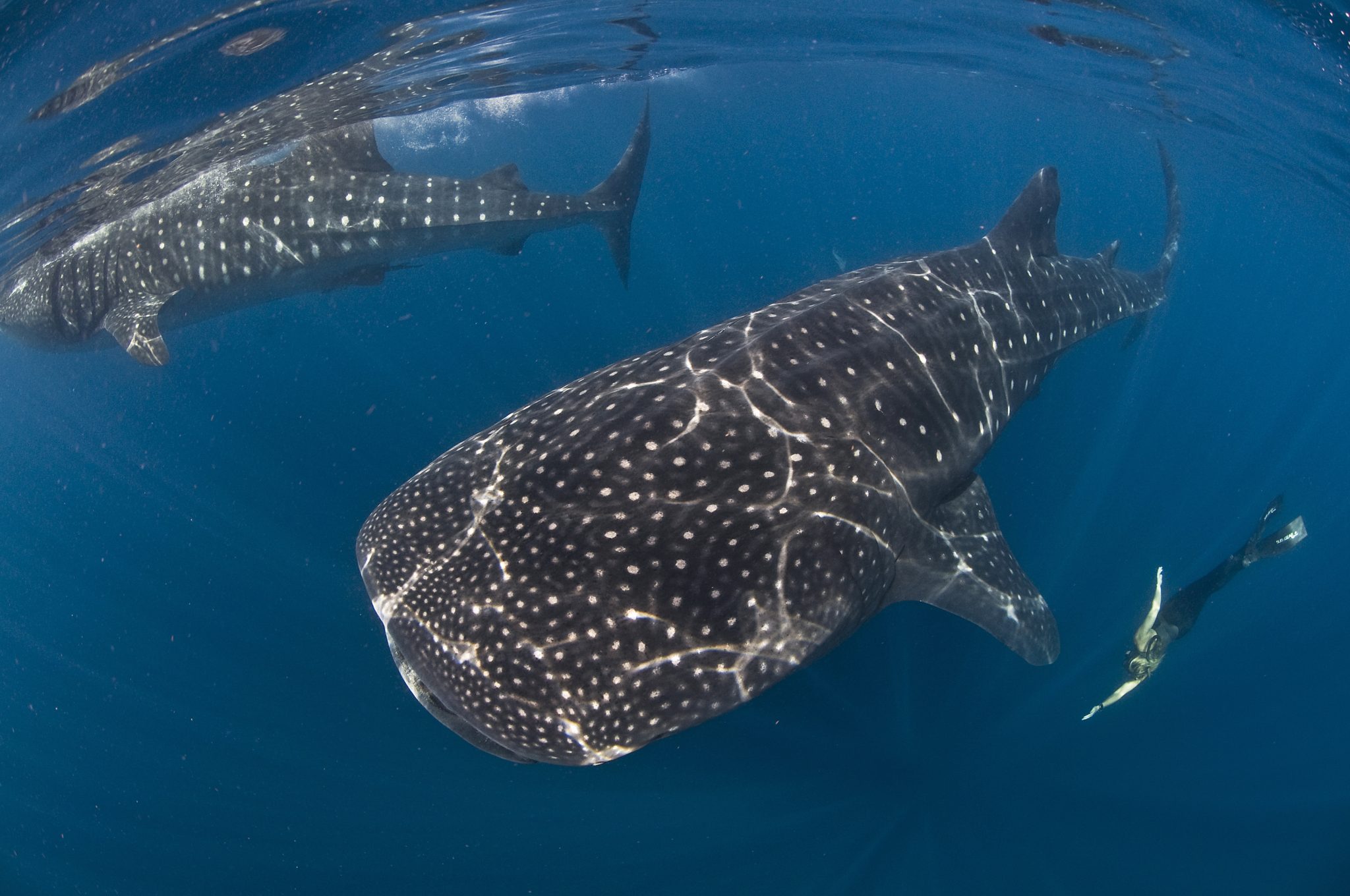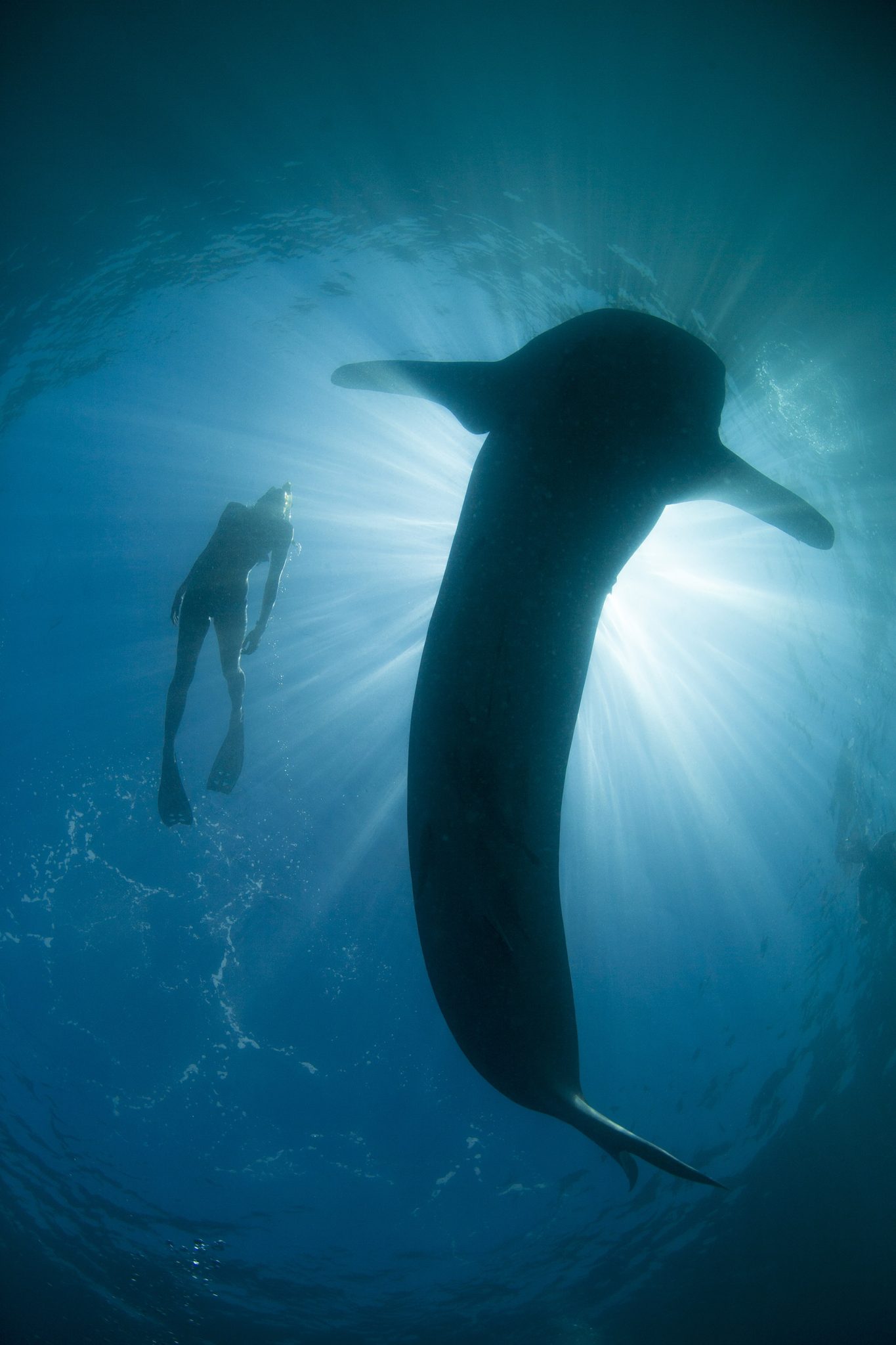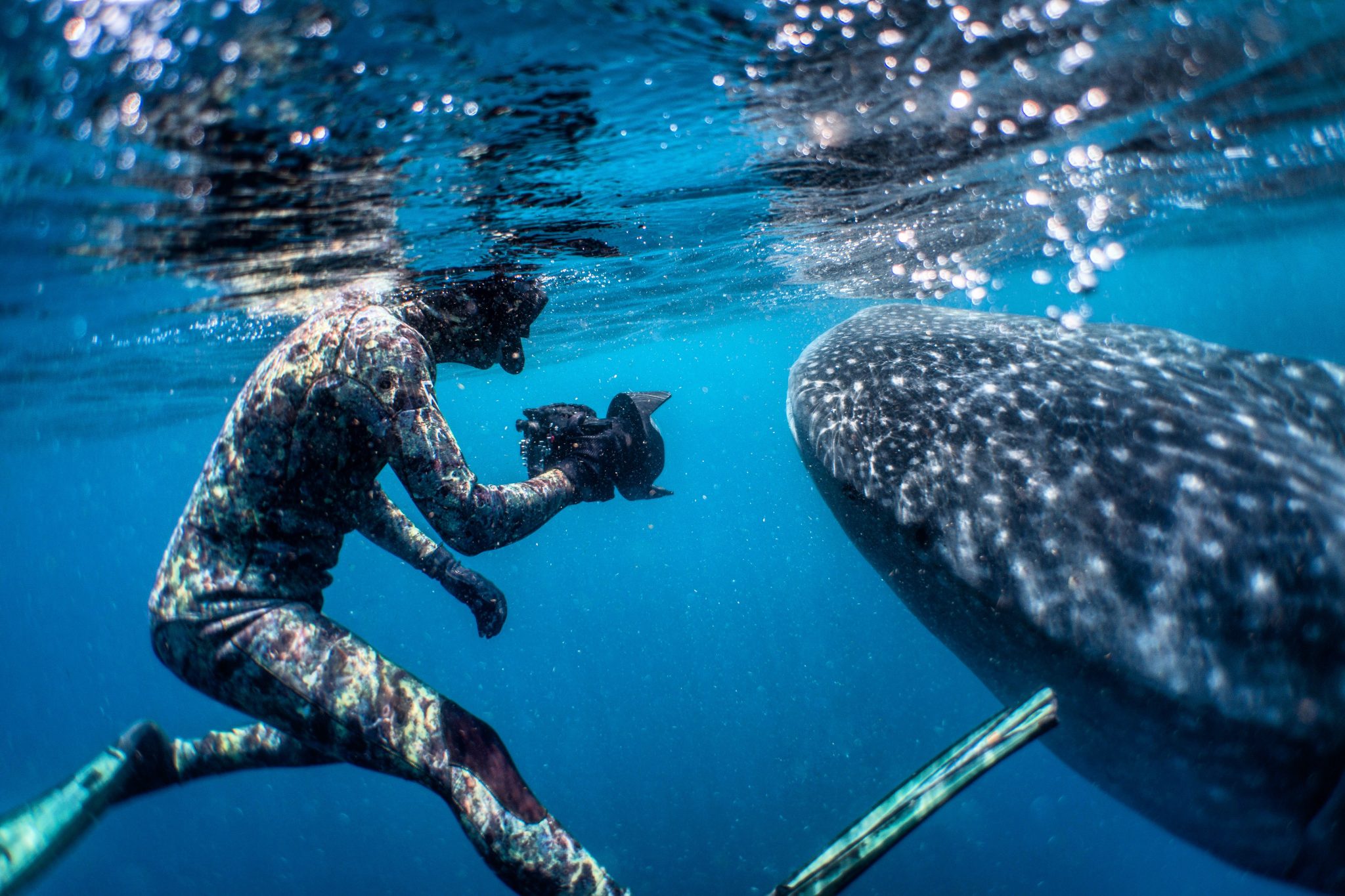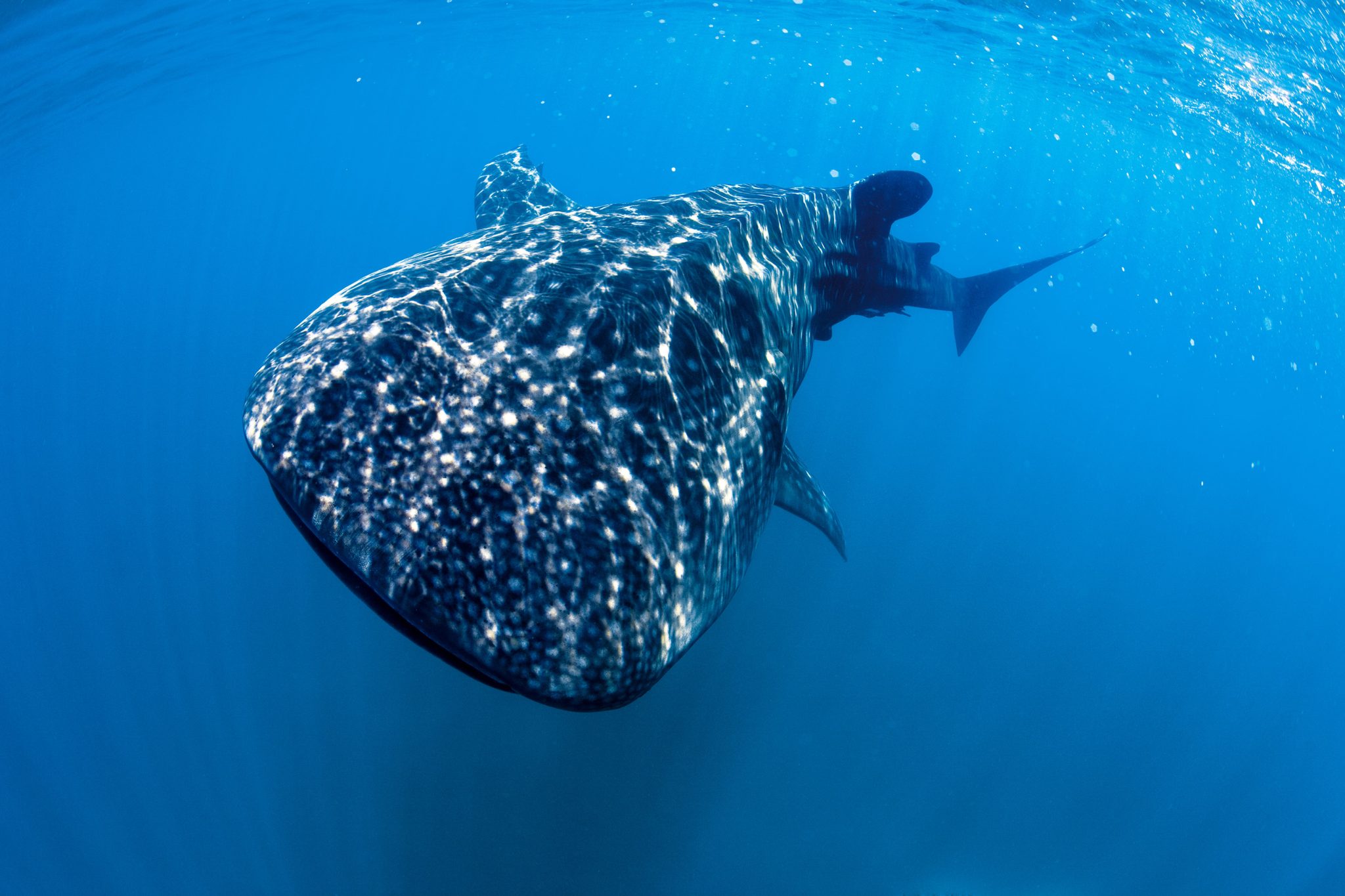Marine Life & Conservation
Celebrating the biggest fish in the sea: International Whale Shark Day 2022
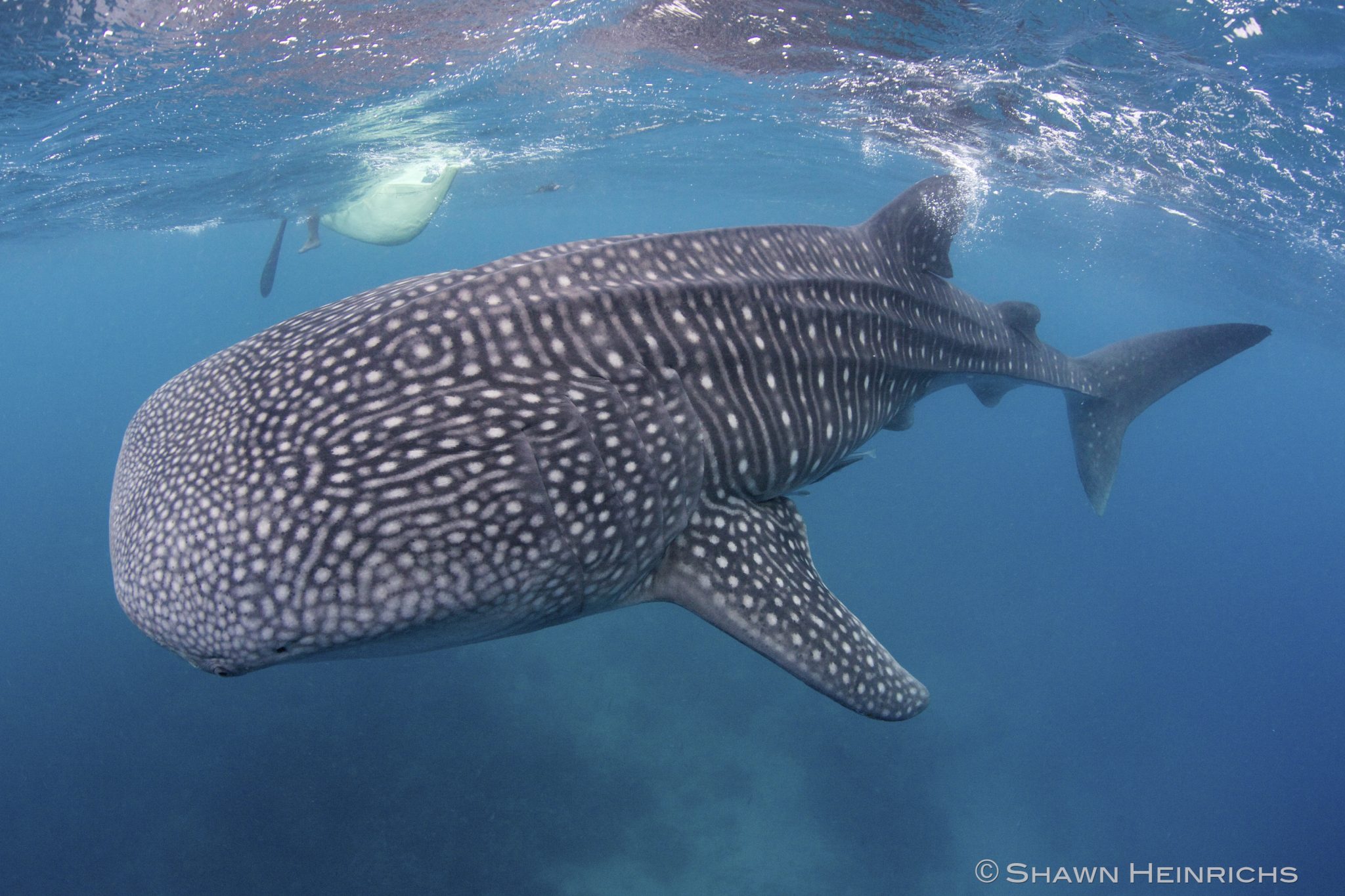
On August 30, the world is showing the biggest shark that lives in our oceans some big, BIG love. Because believe it or not, the biggest fish in the sea needs all the love they can get! Sure they are a shark – but they are the closest thing to a vegetarian that exists in the shark world. Filter feeders, they eat plankton. While their mouths are 4 feet wide, their throats are the size of a quarter. And before you begin to worry about their 3000+ teeth, you should probably know they are only the size of the head of a match.
It’s hard to believe given the fact they can grow up to 40 feet in length and weigh up to 20 tons, but they are very elusive and proficient in the art of underwater camouflage. In fact, Jacques Cousteau only saw three in his lifetime!
They are found in all temperate and tropical oceans around the world except for the Mediterranean Sea, and can migrate thousands of miles between feeding areas. They spend most of their lives near the surface, but have been known to dive to depths of almost 2,000m.
These gentle giants are magical – with a unique dot pattern that is specific to each individual whale shark. Their populations are so low that there is a genetic similarity among all whale sharks worldwide. Whale sharks play an extremely important role keeping the oceans healthy while also creating sustainable income for local communities through tourism. However, like many other shark species, whale sharks are classified as Endangered on the IUCN Red List of Endangered Species, with declining populations worldwide. With massive migratory areas that make them difficult to protect, the fact they are often bycatch or targeted for their meat + fins, and as filter feeders that they often consume micro-plastics, whale sharks need all the help they can get.
Here’s everything you need to know about these incredible fish – including how to meet them, how to protect them, and how to celebrate them every day!
Whale Shark Fun Facts:
- Name: Rhincodon typus
- Size: 18- 40 feet
- Weight: up to 20 tons (equivalent to 3 African Elephants, a full school bus or 12,000+ bricks!)
- Physical features: mouths are 5 feet wide with 3,000 teeth, eyes are as big as golf balls
- Life Span: estimated 60-100 years
- IUCN Red List Status: Endangered
1) Love Tropical Waters Both Deep and Shallow
The preferred environments of whale sharks are tropical and temperate waters and all over the world, including both deep and shallow coastal waters and lagoons of coral atolls.
A marine biologist named Eric Hoffmayer recorded the deepest dive yet: in 2008, he monitored a shark in the Gulf of Mexico that descended 6,324 feet. Sharks lack a swim bladder that keeps other fish buoyant, so one idea is that whale sharks free-fall toward the seafloor to rest.
Whale sharks especially love the Philippines. In 2016, the 1000th whale shark was identified in Philippine waters, making the Philippines the third largest known aggregation of whale sharks in the world and the biggest in South East Asia.
2) Endurance Swimmers Who Are Global Travelers
Whale sharks are one of the most migratory species and can travel around 40 miles per day! They tend to prefer different geographic locations at various times of year based largely on water temperature, food supplies and breeding opportunities. Genetic studies show that whale sharks across the globe are closely related which suggests that mating is one of the reasons for such long travels.
It is believed that pregnant females will migrate long distances to be able to give birth near remote islands where baby sharks will be out of reach of common predators.
But they are also slow swimmers (for sharks) usually moving at no more than 3 mph. Their swimming pattern is different than most sharks in that instead of using just the caudal fin for primary propulsion, they use the full posterior two-thirds of their body length.
The record for whale shark migration was 12,000 miles by a whale shark named Anne in 2011. She was tracked making the mammoth migration from near Panama in the southeastern Pacific, to an area close to the Philippines in the Indo-Pacific. Other tracked whale sharks have traveled:
- Over 8,000 miles from the Gulf of CA, Mexico to Tonga
- 3,107 miles to the coast of Thailand
3) They Enjoy Alone Time
Whale sharks are usually solitary creatures but come together for months in large aggregations to feed in plankton-dense waters. After feeding, they drift off in random directions, completely disappearing during winter and spring.
4) They Practice Vegetarianism
Whale sharks can eat plankton up to 45 pounds of plankton each day (which is equivalent to 121 cheeseburgers per day). But they also eat shrimp, sardines, anchovies, mackerels, squid, tuna, and albacore. and fish eggs. According to The Nature Conservatory, whale sharks will wait as long as 14 hours for fish to spawn on reefs and then they will swoop in and eat the eggs.
But they also largely have a vegetarian diet, especially when other prey is scarce. Scientists discovered that whale sharks get more than half their nutrients from plants and algae.
5) Each Baby Whale Shark is a Miracle!
Whale sharks are ovoviviparous, meaning they produce eggs that hatch inside the mother’s uterus. Litters can be up to 300 pups but not all pups are birthed at the same time. That is almost twice as many as any other shark species.
But only one pregnant whale shark has ever been studied and, interestingly, many of these embryos were at different stages of development. Scientists observed that some were still in their egg cases whilst others had emerged but were still in the uterus. This may signify that females are able to store a male’s sperm, selectively fertilizing their eggs over a prolonged period.
Juvenile whale sharks, as docile and vulnerable as their elders, often become prey for other sharks and orcas, so while a female may birth more than 300 pups at a time, survival rates are devastatingly low; females giving birth to multiple litters at different times could increase their survival rate which could be why they have their very own, built-in sperm banks.
Making the birth of a whale shark even more miraculous is the fact that each whale shark’s pattern is as unique as a human fingerprint!
Think You Know Whale Sharks? Click here for a fun way to test your whale shark IQ!
Header Photo: Whale shark in Oslob by Shawn Heinrichs
Marine Life & Conservation
Paul Watson Released as Denmark Blocks Japan’s Extradition Bid

Renowned anti-whaling activist Paul Watson has been released from custody in Greenland after spending five months in detention. Denmark’s Justice Ministry rejected Japan’s request for his extradition, citing insufficient guarantees that his time already served in custody would be credited against any potential sentence.
The 74-year-old Canadian-American was arrested on July 21 in Nuuk, Greenland’s capital, when his ship docked to refuel. His arrest was based on a 2012 Japanese warrant related to a 2010 encounter in Antarctic waters. Japan alleged Watson obstructed operations and caused damage to a whaling research ship during efforts to disrupt illegal whaling. Watson has consistently denied these claims, maintaining his commitment to marine conservation.
Denmark, which oversees extradition matters for Greenland, concluded that while the legal conditions for extradition were met, the lack of assurances from Japan regarding time-served credit made extradition untenable.
In a video shared by his foundation, Watson expressed gratitude and relief, saying, “After five months, it’s good to be out… and good to know they’re not sending me to Japan.” He added that the most difficult part of his time in custody was being separated from his two young sons.
Watson is a pioneering figure in marine conservation, known for founding the Captain Paul Watson Foundation in 2022 after decades of activism with the Sea Shepherd Conservation Society. His bold efforts to defend marine life have earned him widespread support, including from celebrities and conservationists. His work has also been featured in the acclaimed reality TV series Whale Wars.
Watson’s lawyer, Jonas Christoffersen, praised the decision, stating, “We are happy and relieved that Paul Watson is now free.” He added that Watson is eager to reunite with his family and continue his vital work.
The arrest occurred while Watson’s vessel, the M/Y John Paul DeJoria, was en route to the North Pacific with a team of 26 volunteers to intercept a Japanese whaling ship. His foundation described the arrest as politically motivated and emphasized that Watson’s actions were focused on ending illegal whaling practices.
Japan resumed commercial whaling in 2019 after leaving the International Whaling Commission, asserting that whale meat is a cultural tradition. Conservationists, however, continue to challenge these practices, highlighting their impact on marine ecosystems.
Despite the challenges, Watson remains steadfast in his mission to protect marine life and bring attention to whaling practices. His dedication to ocean conservation has made him a globally respected advocate for the environment.
Marine Life & Conservation
12 Days of Zero-Waste Fish-mas

This holiday period, the Marine Conservation Society, the UK’s leading ocean membership charity, invites you to make some simple changes to eating fish this Christmas to help our seas.
Dr Kenneth Bodles, Head of Fisheries and Aquaculture at the Marine Conservation Society, said, “During the festive season, our consumption increases, but so does waste. Sustainability isn’t just about where food comes from – it’s also about how you use it. By reducing waste and making the most out of your seafood, you’re not only taking steps to be more ocean-friendly, but can also help to cut costs during what is often one of the most expensive times of the year”.
The Marine Conservation Society has compiled twelve tips on how to consume seafood sustainably with zero-waste this Christmas:
Buy whole fish instead of fillets
Instead of fillets, consider buying whole fish such as salmon, hake, or lemon sole. By adopting a “nose to tail” approach with cooking, whole-baked fish not only feeds a crowd, but also helps to minimise waste and maximise sustainability by using up every part of the animal, including bones, skin, and fat.
Make fish stock
Leftover fish bones or shells can be put to good use by boiling them to make a nourishing fish stock or bisque. This can be frozen and preserved for later use and makes for a flavourful base in a soup.
Make your own fish pâté
Avoid waste by turning leftover fish, such as smoked mackerel or salmon, into a delicious pâté by blending with cream cheese and lemon. Perfect when paired with crackers.
The sustainability of salmon and mackerel varies depending on where and how it is caught or farmed. For more information on green-rated options, check the charity’s Good Fish Guide.
Buy frozen
By purchasing seafood that is frozen or vacuum-packed, this helps to reduce waste by extending the shelf life of your food.
Fish pie
If you’re wondering what to do with leftover cooked fish, why not opt for a classic fish pie with mashed potatoes, leeks, and a cheesy sauce? A sure crowd pleaser on Boxing Day.
Use the head
Don’t forget the fish head! The meat is incredibly tender and flavourful. The charity recommends a cod’s head curry or recreating Fallow’s renowned cod’s head in siracha butter.
By stretching your ingredients further, not only is this a more sustainable way to enjoy seafood, but also cost-effective by repurposing leftovers and cooking creatively.
Boxing Day brunch
Mix leftover kippers or smoked salmon with scrambled eggs for a tasty, zero-waste, Boxing Day brunch.
For best choice, make sure you buy kippers, or herring, from the North Sea and the North Irish Sea.
Zero-waste storage
A top tip from the Marine Conservation Society to avoid waste is freezing fish offcuts to save for future use.
Crisp up the skin
Even leftover fish skin can be turned into a quick savoury snack by crisping it up in an air fryer with a little olive oil and salt.
Anchovies two ways
Leftover anchovies can either be blended with butter to make a delicious anchovy butter or tossed into pasta for a hit of umami flavour.
The charity recommends opting for anchovies caught in the Bay of Biscay for best choice.
Fishcakes
For an easy, zero-waste meal, leftover seafood trimmings can be mixed with mash and fried in breadcrumbs to make fishcakes.
Pickled mussels
Try pickling mussels in 1:1 vinegar and water, with a dash of sugar for a sustainable, zero-waste snack that can be enjoyed well beyond the festive season.
Mussels farmed in the UK are a seafood superhero. Grown using low-impact methods and harvested by hand, they get all the food they need from the sea around them. This makes them one of the most sustainable, ocean-friendly, and cost-effective seafood options.
Players of People’s Postcode Lottery have raised £6.6M towards the Marine Conservation Society’s vital work in making seafood more sustainable.
Laura Chow, Head of Charities at People’s Postcode Lottery, said: “Fish is a festive favourite for many, but making sustainable choices when it comes to how we buy and eat seafood makes all the difference for our ocean. Support from players of People’s Postcode Lottery has helped the Marine Conservation Society further its sustainable seafood work, so that we can all enjoy healthier, better protected seas.”
The Marine Conservation Society encourages you to make sustainable seafood choices a year-round habit, not just for Christmas. To check how sustainable the seafood on your plate is, you can visit the charity’s Good Fish Guide. The Guide helps consumers and businesses identify the most sustainable seafood using a simple traffic light system, based on where and how species are caught or farmed. Green is the best choice, amber means improvements are needed, and red indicates fish to avoid buying.
Zero-waste gift idea
Why not embrace a zero-waste Christmas by gifting a membership to support marine conservation? It’s a meaningful, low-waste gift that helps protect our ocean for generations to come. Memberships start from as little as £5 a month – the price of a sandwich and drink from your local coffee shop.
Find the latest sustainable seafood advice for wild-caught and farmed seafood on the Good Fish Guide, downloadable to your phone from www.mcsuk.org/goodfishguide.
-

 News2 months ago
News2 months agoIconic SS United States to become the World’s Largest Artificial Reef
-

 News3 months ago
News3 months agoBook Review – 52 Assignments: Underwater Photography
-

 Gear News3 months ago
Gear News3 months agoDYNAMICNORD – New German diving brand enters the British market
-

 News3 months ago
News3 months agoExploring Cenote El Pit: A Diver’s Dream
-

 Gear News3 months ago
Gear News3 months agoTry BARE drysuits (and maybe even win one!) this Friday with Sea & Sea at North West Dive Fest
-

 Marine Life & Conservation3 months ago
Marine Life & Conservation3 months agoBook Review: Coral Triangle Cameos
-

 Blogs2 months ago
Blogs2 months agoDive the Egyptian Red Sea this Autumn with Regaldive
-

 News3 months ago
News3 months ago2024 Ocean Art Underwater Photo Competition Announced


